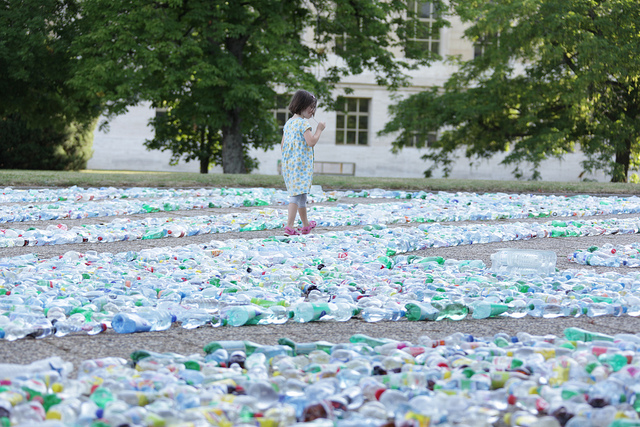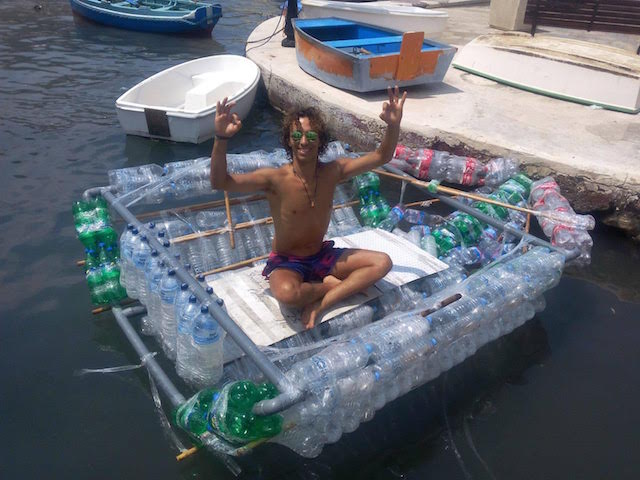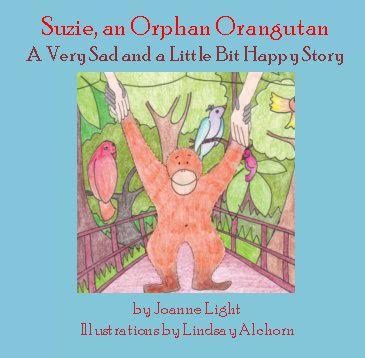
Only when the last tree has died
and the last river been poisoned
and the last fish been caught
will we realise we cannot eat money
~ Cree Indian Proverb
I feel that by just living on the earth, we are placing a burden on resources.
Research shows that no matter how consciously parents shop or diligently recycle, having children is bad for the planet. Coupled with that, no one desires that future generations grow up surrounded by the waste created by their ancestors.
Having children has made environmental awareness a priority for me. I try to make a game of creating as little refuse as possible, making sure we only fill one garbage bag a week maximum; it’s possible to do even less. Once it becomes routine and when it’s accepted as non-optional, recycling, reusing and environmental consciousness is incredibly easy and rewarding.
Of course, there’s always a trade-off to be considered. The most environmentally friendly of people seem to drive the least environmentally friendly of cars. I only got a car recently and try to limit its usage. Also, rinsing a tahini jar clean may mean the water consumption negates the benefit of recycling (I put mine in the dishwasher).
Simply trying to reuse, buying second-hand items, buying locally grown produce where possible, and keeping consumption of all resources to a minimum. By saying no to plastic shopping bags etc, turning lights and taps off, children will learn great habits to sustain their planet (let little ones fill their own back pack at the checkouts for example, or help them fill one). Just by being surrounded by these decisions, children which naturally become aware of environmental conservation.
Below are some further ideas on how to make a game of engaging the next generations in global awareness and helpful habits:
1. Travel. I believe the ease of traveling depends largely on the type of children (some children enjoy change, others may have health problems or need a more settled environment), but trips abroad can be tailored depending on the adaptability of the kids involved. Travel broadens the mind. Seeing oceans full of plastic, and explaining where this comes from; seeing how some countries separate all their rubbish for recycling and discussing where it goes and why—these experiences can open up all kinds of conversations and nurture inquisitiveness and decision-making skills. When I stay in one town I start to feel very pessimistic about the world. When I travel I realise what a beautiful place Earth is, what a privilege it is to be alive, and taking care of nature in anyway I can becomes a priority.
2. Take compostable waste to a local (organic) farmer. I started doing this and my kids naturally asked where it goes and the farmer showed us the whole process. Going to this farmer with our empty cardboard boxes and compost, and coming home with vegetables is now the highlight of our week. They pick their own vegetables and eat things I wouldn’t know existed. It took a few years to find this farmer, but to see my kids in this environment warms my heart and makes me hopeful about the future of the planet.
3. Build things from reusable materials. Kids love making things, my son tells me to save everything from bottle tops to old bits of cardboard, as a BBC children’s TV program uses some recycled materials to make things. Make a raft from old plastic bottles or save up things like kitchen roll tubes, cereal boxes and see if schools or kid’s clubs need them. I think I look like the crazy lady with my car full of recycled goods, dropping them off to art club or summer camp, but I feel better about my place on earth for doing so.

4. Spend time outdoors. This creates more appreciation of the natural world and all its treasures, which has a twofold effect: One of simplicity, of less dependency and reliance on gadgets and things and foods that come in packaging. Two it creates a deep appreciation of the natural world as it is, and therefore a desire to keep it this way and not dump rubbish in it. (This is all aside to the physical and mental health benefits of being outdoors of course.) Some methods of schooling encourage children to spend nearly all their time in the outdoors, as it is beneficial for behaviour, mood, circadian rhythms and creativity. Camping outdoors even for a night or two, if only in a garden, helps to reset natural sleep cycles, especially if the technology is left at home.
5. Books. I remember as a child in the 80s learning from a book about aerosols and greenhouse gasses. Imagine the panic I felt at eight years old that there may one day be no trees, and thus no air left to breathe.

This wonderfully illustrated, not-for-profit book about the poignant issue of deforestation, focuses on the true story of one orphaned orangutan. (The details are a bit home-hitting for younger children, but no worse than the Lion King. However details can be glossed over for younger kids.) The back pages include ideas for further steps in the local communities.
That this large-scale deforestation is pushing many species to extinction (and findings show that if nothing changes species like the orangutan could become extinct in the wild within the next five to 10 years, and Sumatran tigers less than three years) really shocked my five-year old children into wanting to take action. Other species facing extinction include, the Sumatran Rhinoceros, Sun Bear, Pygmy Elephant, Clouded Leopard and Proboscis Monkey.
Looking at pictures and reading about these animals and explaining how little steps we can take as humans to reduce waste and our consumption of palm oil and other natural resources is engaging and empowering once children realise what influence they have to make big changes in their world.
All-in-all these steps can be exciting, positive and enjoyable experiences for families, as opposed to more commercialised activities (which are often costly for both parents and the planet).
“A thing is right when it tends to preserve the integrity, stability and beauty of the biotic community. It is wrong when it tends otherwise.”
~ Aldo Leopold, A Sand Country Almanac
I hope you enjoyed this article. If you have any questions or ideas of other ways to engage children in caring for the planet, please post below. Thanks!
Relephant:
13 Ways to Care for the Planet & Ourselves.
~
Author: Hannah-Marie Martin
Editor: Travis May
Images: Flickr/United States Mission Geneva, Let’s Do it Malta–Used with permission











Read 0 comments and reply